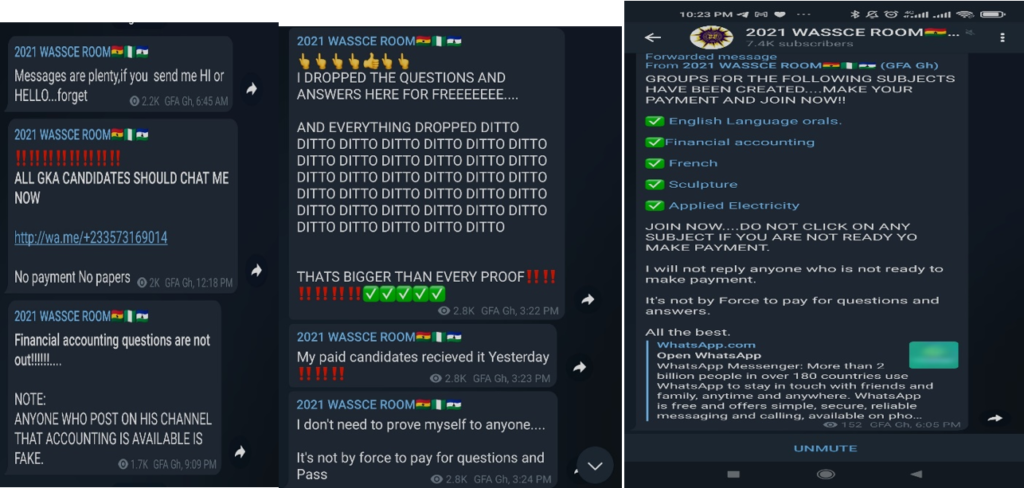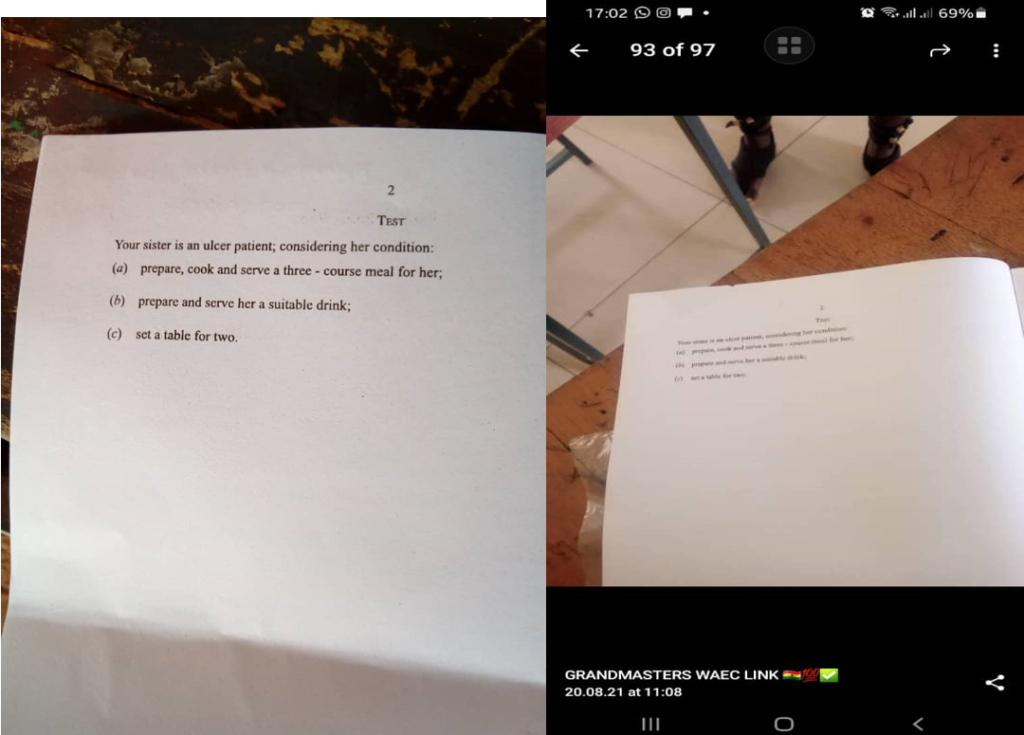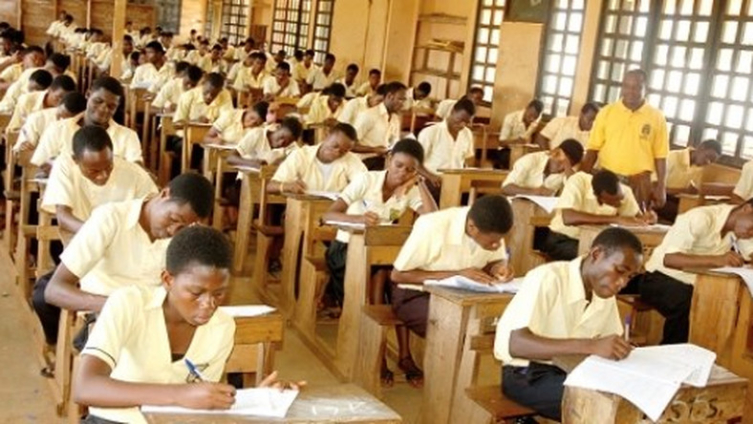It’s 2: 42pm, the day was Sunday, August 22, a normal Sunday as always except there was no Fufu to eat or rest to catch but oh! there was a football match to follow; Chelsea Vs Arsenal.
With no television to even catch a glimpse of the football match, I resorted to following the updates on Twitter, before I could log on, notifications buzzing from my telegram messaging app came ‘flooding’ with messages that read “Payment ongoing for French Orals confirmed”, “Financial accounting questions are not out yet”, and “Those writing GKA should text me, posting questions here isn’t safe. For security purposes if you know you are writing text me for it”.
Attached to these messages were phone numbers interested parties could reach out to for the purchase of the supposed 'apor'.
All three notifications came from three different telegram platforms with group names being; GRANDMASTERS WAEC LINK, WAEC AND GES NEW FILE, 2021 WASSCE ROOM.

For a while, my mind meandered, “When did I join these platforms ?” Instantly, I remembered I joined these platforms sometime last year to carry out an investigative news report on the examination black market.
This individual initiative was however short-lived as a result of contracting and breaking down to Covid-19. My energy and time went into getting myself out of isolation and kicking against Covid-19 long-term complications.
Several reports of WAEC’s exams being leaked, dubbed "apor," hours or even days before papers are written, have surfaced throughout the years. As a result, WAEC has had to cancel examinations in some years so that candidates can rewrite them.
This happened in 2002 when BECE questions were canceled due to widespread leakage, and it happened again in 2015 when 5 BECE papers were canceled due to widespread leakage. Due to leaks, WAEC had to cancel some subjects in the 2008 WASSCE.
Even before entering the exams hall, some teachers and students in various schools across the country have been observed carrying solved questions from papers they were going to write. And these questions emerged in the exams just as they had before entering the room.
The widespread use of social media and mobile phones by most WASSCE candidates in Ghana exacerbates the problem of examination leakage. Students and teachers can view the leaked questions on their phones via social media. Every year, when it comes time to pass their final exams, either BECE or WASSCE, pupils are well aware that they will get "apor." These students anticipate it; in fact, they believe it is a part of their rights as candidates, and they will go to any length to obtain it, including soliciting funds to cover the costs.
There has been allegations and counter-allegations as to how and why these examination leakages keep rearing their ugly head.
How does WAEC keep track of the printing and packing of exam questions, who distributes them across the country, and who keeps an eye on them after they reach the various districts where the exam is held?
In an attempt to unravel the mystery of malpractices surrounding the conduct of examinations, an education think tank Africa Education Watch independently assessed the 2020 West African Senior School Certificate Examination (WASSCE) and confirmed that the 2020 questions leaked to candidates.
The education think tank stated in its report on June 16, 2021, that the questions were leaked on the dawn of each paper and sent to various social media groups.
The think-tank faulted social media pages including Telegram groups for being a source of leaked questions.
Confidential information about examiners was also exposed, causing WAEC to file a case with the Ghana Police Service's Cyber Crime Department.
Not long after, WAEC disputed portions of Africa Education Watch’s report on the 2020 West African Senior School Certificate Examination (WASSCE).
At a press conference, the Council insisted that portions of the report that touched on the leakage of a mathematics paper and the widespread details of examiners and the methodology itself were fraught with inaccuracies.
WAEC also considered suing Africa Education Watch over its report on the assessment of the 2020 West African Senior School Certificate Examination (WASSCE).
Fast forward to Friday, August 20, 2021, Mr Kofi Asare the executive director of Africa Education watch again the alleged leakage of some WASSCE examination questions. He wrote ;
“Today's Food and Nutrition Paper 3 which was scheduled for 1:30 PM, was leaked on social media at 6:00 am yesterday and 11:06 AM today.
We reported to WAEC at 11:10 AM, and can now confirm it is indeed a genuine leak. The paper is just starting at the Centres.
Eduwatch is monitoring WASSCE 2021 with the support of OXFAM, and will continue collaborating with WAEC to improve accountability in the Education Assessment Sector.”
Not so surprising, WAEC on Monday, August 23 at another press conference denied claims by African Education Watch, that the practical examination paper for Food and Nutrition, which was administered on August 20, leaked.
The current impasse keeps me worried.
Why is WAEC always quick to issue denial statements when people complain about leakages?
There is scarcely a year that there weren't allegations of examination leakages, yet, WAEC will pretend it doesn't exist; they are rather interested in denying to protect their already tarnished institutional integrity than providing a credible assessment of students.
I am not in deep shock over these recurring developments, there is no alternative examination body, so we have no choice but to go to WAEC every year.
I paid a visit to Mr Kofi Asare who invited me to see exhibits of evidence gathered in the buildup to alleging the leaked Food and Nutrition practical questions.
In his office, he projected screenshots of chats he had with one WAEC official, Kwame (not his real name) detailing how the said Food and Nutrition paper leaked, the screen projections also came up with snapshots of what could be the place where the leakage happened.
“This is one of the papers that was written, and these are questions that were leaked. So, the question we sent to WAEC was 2 hours before the paper as shown in my WhatsApp conversation with Kwame, a test officer at WAEC. It is the same questions that appeared in the exam at 1: 30pm on Friday and Kwame called me to confirm that indeed those are the questions. If you look carefully at the picture I am showing you, you could see the boot of a security man in the background.”

Mr Asare explained that WAEC’s attempt to deny these leakages only makes it obvious that they have failed in addressing the canker.
In August 2020, the then Deputy Education Minister, Dr. Yaw Adutwum who’s now the substantive Minister, questioned the sagacity of the West African Examination Council’s (WAEC) monopoly in the wake of the alleged leaks that marred the WASSCE examinations.
The Minister for Education and President Nana Akufo-Addo have both hinted at reforming the educational assessment system in the country, that commitment alone is an admission that indeed there is a problem.
Many people have advocated for eliminating human intervention from exam administration. This means that until the results are released, the majority of WAEC's exam tools and procedures, from pre-exams to post-exams, must be computer-driven.
Acting Executive Director for the Institute for Education Studies (IFEST), Mr Peter Ante another educational policy think tank in Ghana proposed that two types of certificates after the fourteen years of a student’s education in Ghana should be developed: the Senior High School Leaving Certificate (SHSLC) and WASSCE to ease the pressure on students and parents who will find any ways and means to excel in the WASSCE to enable their wards to secure any form of employment in the job market.
To achieve this, he explained that there should be an assessment framework that takes into account the formative assessments of the student from at least Basic 7 to the final year in senior high school. Such a comprehensive assessment system would give a true picture of the capabilities and competencies of the student.
The student would then have to write one comprehensive paper which can be termed as a General Paper which touches on a bit of all that the student has studied during the fourteen years of his or her education. This examination which will form 30% of the overall assessment of the student coupled with the internal cumulative assessment of the student (70%) would qualify the student to obtain what can be called Senior High School Leaving Certificate (SHSLC).
Africa Education Watch amongst other things says taking steps to break the monopoly enjoyed by the West African Examination Council, WAEC, in assessing students and conducting examinations in Ghana will improve standards in our educational sector.
While WAEC should be held accountable for any imminent exam leaks, we also need to focus our campaign on the redirection of Ghanaians' moral compass as we look into collectively nipping this canker in the bud or it will get to a point our certificates would lose relevance.
Latest Stories
-
King Charles to resume public duties after progress in cancer treatment
6 mins -
Arda Guler scores on first start in La Liga as Madrid beat Real Sociedad
16 mins -
Fatawu Issahaku’s Leicester City secures Premier League promotion after Leeds defeat
28 mins -
Anticipation builds as Junior Speller hosts nationwide auditions
59 mins -
Etse Sikanku: The driver’s mate conundrum
2 hours -
IMF Deputy Chief worried large chunk of Eurobonds is used to service debt
2 hours -
Otumfuo Osei Tutu II celebrates 25 years of peaceful rule on golden stool
2 hours -
We have enough funds to pay accruing benefits; we’ve never missed pension payments since 1991 – SSNIT
2 hours -
Let’s embrace shared vision and propel National Banking College – First Deputy Governor
3 hours -
Liverpool agree compensation deal with Feyenoord for Slot
3 hours -
Ejisu by-election: There’s no evidence of NPP engaging in vote-buying – Ahiagbah
3 hours -
Ejisu by-election: Independent ex-NPP MP’s campaign team warns party against dubious tactics
3 hours -
ZEN Petroleum supports Tse-Addo Future Leaders School
4 hours -
NPP must win back Adentan seat in 2024 polls – Obeng Fosu
4 hours -
PPA Clarification: The dark side of the World Bank’s ‘giveaways’ in Ghana by Bright Simons
5 hours

